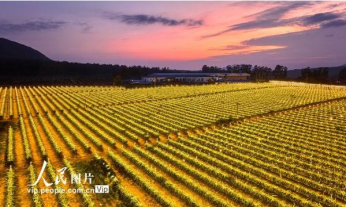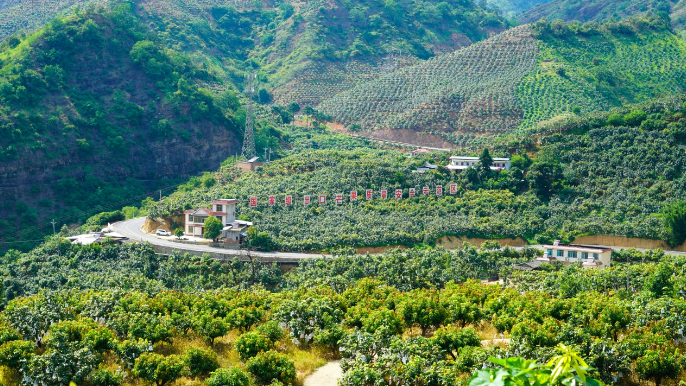SANYA, July 30 (Xinhua) -- After several academic exchange trips to China, Thomas Gbokie, former deputy agriculture minister for regional development, research and extension at the Liberia Ministry of Agriculture, decided to continue his studies in China in 2018.
After completing his master's degree, which was jointly awarded by Nanjing Agricultural University and the Chinese Academy of Tropical Agricultural Sciences (CATAS) in Sanya, south China's Hainan Province, he jumped at the opportunity to study for a plant pathology PhD, specializing in disease control in coffee.
At Yazhou Bay Science and Technology City in Sanya, Gbokie walks quickly between test fields and a laboratory.
"The environment and the climatic conditions of Sanya and Liberia are almost the same, so I hope to put what I learned here into practice in my country," he said.
Agricultural cooperation between China and Africa has become increasingly close. The Chinese Academy of Agricultural Sciences (CAAS) has so far trained 276 students from African countries, and Nanjing Agricultural University has trained 345 senior agricultural technical and management personnel for African countries Since 2003.
Capacity building is key to achieving sustainable agricultural production in Africa, said Felix Dapare Dakora, former president of the African Academy of Sciences, adding that the Chinese government has given a lot of support to African countries in capacity building, and more and more Africans are coming to study in China.
In response to the urgent need of African countries for food production and agricultural development, China has shared knowledge and technologies.
In a field in Sangeng Village of Sanya's Yazhou District, Nigerian student Oluwole Gregory Ijiti followed his mentor Chen Qing to harvest new varieties of cassava under the scorching sun.
"This new variety can be eaten both fresh and processed, and has the characteristics of high yield, insect resistance and strong adaptability," Chen said.
Nigeria is the country with the largest harvested area for cassava, an important staple crop in the country. Chen, a researcher at CATAS, helped Ijiti find his research direction in consideration of the actual needs in cassava production in Nigeria and Ijiti's goal of improving capacity for technological innovation.
Tanzanian student Mkapa Dietram Samson came to Sanya with a clear goal -- to learn as much as he could about sisal. Tanzania is known for sisal production, but lack of advanced technology has seriously restricted the development of the industry in the country. Tanzania is looking to carry out cooperative research with China to improve the production level of its sisal industry.
"The mainstream sisal variety grown in China, the H11648, is from Tanzania. But it is amazing to find how fast technology has developed here," Samson said, adding that he hopes to learn and introduce China's sisal breeding technology and seedling tissue culture technology back home.
In order to expand the test area and speed up the research process, Samson's mentor Yi Kexian, with CATAS, planted many sisal plants in the open space around the laboratory. Yi often takes his African student around on an electric bike to check sisal growth and record data.
Many Chinese agricultural research institutions have extended invitations to African agricultural researchers to study in China and undertake joint research at the workshop on China-Africa Agricultural Science and Technology Cooperation under FAO South-South Triangular Cooperation Framework held in Sanya this year.
Sun Tan, vice president of CAAS, said that the academy would build an international education institute in Sanya, focusing on recruiting African students to carry out scientific and technological innovation in the seed industry, and the number of international students there will double within five years.
Meanwhile, 30 young African agricultural scientists will be provided with one-year training at the National Nanfan Research Institute (Sanya) under the CAAS, Sun said
News report Link:https://english.news.cn/20240730/61f910f10eb749f6b55492a2156f28db/c.html








 琼ICP备11000394号
琼ICP备11000394号 琼公网安备 46010602000325号
琼公网安备 46010602000325号